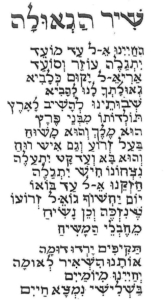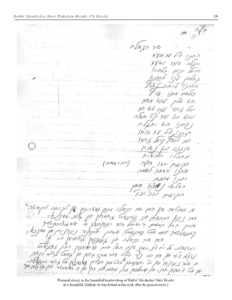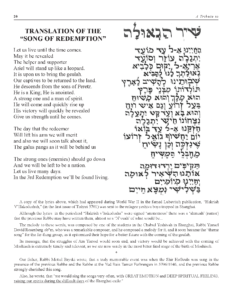| Source (Hebrew) | Translation (English) |
|---|---|
הֶחֲיֵּנוּ אֵל עַד מוֹעֵד יִתְגַלֶה עוֹזֵר וְסוֹעֵד |
Enliven us, El, until the time arrives that the helper and supporter will be revealed. |
אַרִיאֵל יָקוּם כְּלָבִיא גְאוּלָתְךָ לָנוּ לְהָבִיא שְׁבוּתֵינוּ לְהָשִׁיב לָאָרֶץ תּוֹלְדוֹתוֹ מִבְּנֵי פֶּרֶץ |
Like a lioness,[1] Cf. Genesis 49:9 Ariel will arise — You will bring for us your redemption, Returning us, from our captivity, to the Land; His ancestry is from the children of Perets. |
הוּא מֶלֶךְ וְהוּא מָשׁוּחַ בַּעַל זְרוֹעַ וְגַם אִישׁ רוּחַ וְהוּא בָּא וְעַד קָט יִתְעַלֶה נִצְחוֹנוֹ חִישׁ יִתְגַלֶה |
He is a king and he is annointed, A resolute leader and also a spiritual man. He is coming and will swiftly ascend. His victory will soon be revealed. |
חַזְקֵנוּ אֵל עַד בּוֹאוֹ יוֹם יַחְשׁוֹף גוֹאֵל זְרוֹעוֹ שֶׁנִזְכֶּה וְכֵן נָשִׂיחַ מֵחֶבְלֵי הַמָשִׁיחַ |
Strengthen us El, until he arrives, The day the redeemer’s auxiliary[2] lit. arm will unveil that we shall merit (redemption) and then, we will reminisce of the (time of the) birth pangs of Moshiaḥ — |
תַּקִיפִים יָרְדוּ דוּמָה אוֹתָנוּ הִשְׁאִיר לְאוֹמָה יְחַיֵּנוּ מִיּוֹמַיִם בַּשְׁלִישִׁי נִמְצָא חַיִּים |
This is a vocalized transcription and translation of the World War Ⅱ era song, “Shir haGe’ulah (Song of Redemption)” from the source images shared in A Tribute to Rabbi Mordechai Meir Hakohen Bryski v”g Bryski (Rabbi Mordechai A. Katz, 2017), pp. 19-20. The song is also known by its incipit, “Heḥayyeinu El.”
After transcribing the text, Baruch Jean Thaler helped me to improve the translation. (Thank you!) If you would find an error and can suggest an improvement, then please leave a comment or make contact.
While the author was published as “Anonymous,” others attribute the song to the sixth Lubavitcher Rebbe, Rabbi Yosef Yitzchak Schneersohn (1880-1950). Here are Rabbi Mordechai Meir Bryski’s notes to the shir, as translated from the Yiddish into English in Rabbi Mordechai A. Katz’s tribute:
A copy of the lyrics above, which had appeared during World War Ⅱ in the famed Lubavitch publication, Haqriah v’Haqedushah, (in the first issue of Tishrei 5701 [October 1940]) was sent to the refugee yeshiva boys trapped in Shanghai.
Although the lyrics in the periodical Haqriah v’Haqedushah were signed ‘anonymous’ there was a ‘shmuah’ (rumor) that the previous Rebbe may have written them, almost as a nevuah of what would be…
The melody to these words, was composed by one of the students in the Ḥabad Yeshivah in Shanghai, Rabbi Yisrael Dovid Rosenberg ob”m, who was a remarkable composer, and he composed a melody for it, and it soon became the “theme song” for the far-flung group, as it epitomized their hope for a better future with the coming of the geulah.
Its message, that the struggles of Am Yisroel would soon end, and victory would be achieved with the coming of Moshiaḥ is extremely timely and relevant, as we are now surely in the most bitter final stage of the birth of Moshiaḥ.
* * *
Our father, Rabbi Mottel Bryski wrote, that a truly memorable event was when the Shir HaGeula was sung in the presence of the previous Rebbe and the Rebbe at the Yud Bais Tamuz Farbrengen in 5706/1946, and the previous Rebbe strongly cherished this song.Also, he wrote, that “we would sing the songs very often, with GREAT EMOTION and DEEP SPIRITUAL FEELING, raising our spirits during the difficult days of the Shanghai exile.”
Some find in this song, a hidden acrostic read from the bottom up which can be read, “the Moshiaḥ is coming in 1943.”
Source(s)
Notes

“שִׁיר הַגְאוּלָה (החיינו אל) | Shir ha-Ge’ulah (Song of Redemption, ca. 1940)” is shared through the Open Siddur Project with a Creative Commons Attribution-ShareAlike 4.0 International copyleft license.







![Arthur Szyk's black-and-white frontispiece for an illustrated Polish-language edition of Song of Songs: Pieśń nad Pieśniami [Song of Songs] Translated by Zygmunt Bromberg-Bytkowski. Łódź: M. Szajniak, 1924.](https://opensiddur.org/wp-content/uploads/2017/01/arthur-szyk-1894-1951--piesn-nad-piesniami-song-of-songs-frontispiece-c-1924-lodz-poland-250x250.png)



Leave a Reply